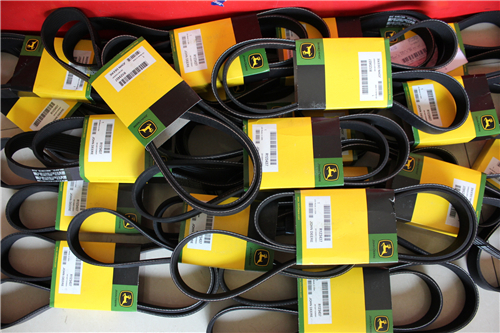

John Deere約翰迪爾強(qiáng)鹿柴油機(jī)進(jìn)氣和排氣系統(tǒng)維修技術(shù)資料
詳細(xì)描述
John Deere約翰迪爾強(qiáng)鹿柴油機(jī)進(jìn)氣和排氣系統(tǒng)維修技術(shù)資料操作

A—Turbocharger C—Intake Side of Cylinder D—Outside Intake Air E—Exhaust Air
B—Air Cleaner Head
NOTE: Two-valve head engine shown. Air intake and
exhaust of four-valve head engine is similar.
Engine suction draws dust-laden outside air (D)
through an air inlet stack into the air cleaner (B). Air is
filtered through dry type primary and secondary
(safety) filter elements in the air cleaner canister.
Clean air travels through the air intake hose to the
turbocharger (A) and into the intake side of the
cylinder head (C).
Exhaust (E), drives the turbocharger to deliver a larger
quantity of air to meet the engine requirements than
what could be delivered under naturally aspirated
(non-turbocharged) conditions.
On some engines, an air-to-air aftercooler cools the
turbocharger compressor discharge air by routing it
through a heat exchanger before it enters the engine.
The heat exchanger uses no liquid coolant but relies
on air flow to cool the charge air.
400-100-8969???15088860848
0574-26871589? 15267810868
0574-26886646? 15706865167
0574-26871569 18658287286



 Deutsch
Deutsch Espaol
Espaol Franais
Franais Italiano
Italiano Português
Português 日本
日本 韓國(guó)
韓國(guó) 阿拉伯
阿拉伯 български
български hrvatski
hrvatski esky
esky Dansk
Dansk Nederlands
Nederlands suomi
suomi Ελληνικ
Ελληνικ 印度
印度 norsk
norsk Polski
Polski Roman
Roman русский
русский Svenska
Svenska 中文(簡(jiǎn))
中文(簡(jiǎn))